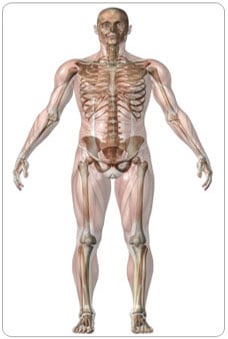Diet and Osteoarthritis
To alleviate symptoms one must ensure intake of adequate calcium and vitamin D, antioxidants, omega 3 fats and glucosamine. If overweight weight reduction is important and maintaining a normal weight can help in keeping the symptoms such as pain at bay.
Nutrients and Extracts
Omega-3 fatty acids: Increased consumption of omega-3 fatty acids and monounsaturated fatty acids such as those found in olive oil can benefit people suffering from arthritis. They affect cellular metabolic functions and support cell membrane structure. The most potent of the omega-3 fatty acids containing oils are eicosapentaenoic acid (EPA) and docosahexaenoic acid (DHA), which are found in abundance in cold-water fish like shrimp, tuna, salmon, mackerel, and lake trout. Mufa rich oils are olive oil, groundnut oil, rice bran oil and sesame oil. Omega 3 fatty acid rich oils are soybean, mustard, rice bran and sesame oil.
Omega-6 fatty acids: These are available in plenty in a variety of foods and therefore we can meet the daily requirement for the same. However omega-3 has varied health benefits and at the same time it is present only in selected foods and oils.
Curcumin and capsaicin: Curcumin is a component of turmeric and capsaicin is an active ingredient in pepper. Both have anti-inflammatory properties. Curcumin and capsaicin also inhibited the secretion of collagenase, hyaluronidase, and elastase, which are linked to the breakdown of cartilage that characterizes osteoarthritis.
Gingerol: Gingerol, an active ingredient found in ginger, is an anti-inflammatory and anti-rheumatic agent used in ayurveda, a form of holistic medicine traditional to India.
Nobiletin: Nobiletin, a bioflavanoid, has shown to be a powerful anti-inflammatory agent. Nobiletin significantly inhibits production of nitric oxide and superoxide, two powerful free radicals involved in promoting inflammation.
S-Adenosylmethionine: S-adenosylmethionine (SAMe) is the activated form of methionine. Glutathione is an antioxidant found in the cells. SAMe protects synovial cells replenishingglutathione.
Nutrients as Joint-Protective Agents
Effective treatment of osteoarthritis includes the protection of cartilage and synovial fluid in the joint against further destruction. It is equally important to stimulate restoration of joint cartilage and synovial fluid. Chondro-protective agents are compounds the body produces to regenerate cartilage and maintain healthy joint function. These agents enhance development of chondrocytes, enhance the synthesis of synovial fluid, and inhibit free-radical damage to proteins and joint cartilage.
Hyaluronic Acid: Hyaluronic acid is a joint lubricant. Hyaluronic acid is a protein that occurs in the skin and is known to be a water binder. Apparently it is able to bind 1000 times its weight in water. Sweet potato has high amounts of hyaluronic acid.
Injections of this substance have shown to relieve pain and disability in other arthritic joints, including the ankle.
Glucosamine: Glucosamine is a naturally occurring substance and is synthesized by chondrocytes (cartilage cells). It stimulates the production of joint cartilage. In osteoarthritis, glucosamine synthesis is defective. Therefore supplementation with glucosamine proves to be beneficial. It has the following functions:
- The glucosamine is used to synthesize proteoglycans and the water-binding glycosaminoglycans in the cartilage matrix.
- Apart from serving as a raw material glucosamine also stimulates the chondrocytes to produce more proteoglycans and glycosaminoglycans.
- It inhibits certain enzymes such as collagenase and phospholipase, which destroy cartilage.
- By blocking pathogenic mechanisms that lead to articular degeneration, it delays progression of the disease and relieves symptoms, even for weeks after termination of the treatment.
Among the natural and diet therapies for osteoarthritis, glucosamine sulfate is probably the best known. Commercial sources of glucosamine are from the exoskeleton of shellfish and are available as glucosamine sulfate and N-acetylglucosamine in the form of supplements.
Glucosamine has been shown to be free of adverse effects, particularly when compared to NSAIDs. Like all natural remedies, the therapeutic effect of glucosamine takes a while. It usually takes 1 to 8 weeks to appear. Its effects than tends to persist for a significant time even after discontinuation of the treatment. The reason behind being, its incorporation into rebuilding the cartilage itself.
Supplements containing glucosamine are used extensively to combat the symptoms of osteoarthritis. Although there are very few natural foods containing glucosamine, some products have been fortified with active quantities of this compound. Spinach and parsley are two green leafy vegetables rich in glucosamine.
Chondroitin sulfate: Chondroitin sulfate is a major structural component of the articular cartilage. It is a large molecule, composed of repeated units of glucosamine sulfate. Like glucosamine, chondroitin sulfate too stimulates the production of cartilage. It has the following functions:
- It also has the ability to prevent enzymes from dissolving cartilage.
- Chondroitin sulfate scavenges or destroys free radicals that degrade joint cartilage and collagen.
- It improves blood circulation to joints. This enables antioxidants and glucosamine to enter inflamed joints to stimulate the repair process required for the regression of osteoarthritis.
Bone building nutrients calcium and vitamin D should be adequately incorporated.
Antioxidants
According to recent research, oxidative stress seems to play a role in osteoarthritis and rheumatoid arthritis. Research has found that human cartilage in patients with osteoarthritis was significantly deficient in superoxide dismutase, a major free-radical scavenger.
Nevertheless, because of the clear connection between
Green Tea Extracts contain polyphenols which are anti-oxidants. Compounds found in green tea, (polyphenol epigallocatechin gallate (EGCG)) prevents the progression of osteoarthritis.







